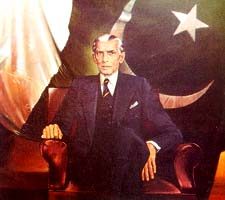|
7.
Jinnah arrives at Mauripur Airport from New Delhi.
9. Muslim member of
Partition Committee, Chaudhri Muhammad Ali comes to Karachi
on a one-day visit for Jinnah's approval on Patel's proposal
for debt settlement. Liaquat Ali Khan asks Ali to convey to
Lord Ismay in Delhi that Jinnah has received disturbing reports
about the likely decision on the Punjab boundary.
12. Constituent Assembly
of Pakistan resolves that Muhammad Ali Jinnah should be addressed
as Quaid-i-Azam Mohammad Ali Jinnah, Governor-General of Pakistan"
in all official documentation from August 15, 1947.
12. Radcliffe signs
his reports for the Punab and Bengal, forming the Award. Ferozepur,
Zira, Gurdaspur and many other areas of Muslim majority in East
Punjab form parts of India, as does the city of Calcutta. Report
is withheld until after the Independence.
13. Radcliffe signs
his reports for Sylhet.
14.
Lord Mountbatten delivers the King's message to the people of
Pakistan, who are to achieve independence at midnight tonight.
The date corresponds with Ramzan 26, 1366 Hijrah. The day is
Thursday.
14. Attacks on trains
by Sikhs in East Punjab forces the Government of Pakistan to
postpone the transfer of records from New Delhi to Karachi until
the situation comes to normal.
15. Amritsar. In
the afternoon, a Sikh mob paraded a number of Muslim women naked
through the streets of Amritsar, raped them and then hacked
some of them to pieces with kirpans and burned the others alive.
16.
Liaquat Ali Khan, in Delhi to discuss the grim situation in
Punjab, and Chaudhri Muhammad Ali are handed Radcliffe's reports
by Mountbatten in the afternoon.
18. Pakistan celebrates its
first Eid-ul-Fitr. While regretting the fate befallen on those
"brethren and sisters" who fell victim to communal
violence, Jinnah also wishes in his official statement "a
very happy Eid to all Muslims wherever they may be in throughout
the World - the Eid will usher in, I hope, a new era of prosperity
and will mark the onward march of renaissance of Islamic culture
and ideals."
19/21. Communal riots
in Quetta
21. Transfer of personnel
and records from New Delhi to Karachi is now completely stalled
indefinitely after disturbances occurred on the B.B. & C.I.
line running through Marwar to Hyderabad. In all, 11500 passengers
have been transferred to Karachi, the new capital, from New
Delhi.
24. Jinnah calls upon the
people of Pakistan not to retaliate unlwafully to the violence
in East Punjab: "Pakistan should be kept absolutely free
from disorder."
25. Jinnah is presented Civic
Address by the Karachi Corporation. In his reply he mentions
that "Karachi has the distinction of being the only town
of importance where, during these times of communal disturbances,
people have kept their heads cool and lived amicably, and I
hope we shall continue to do so."
28/29. A meeting of
the Joint Defense Council, attended by Jinnah and Mountbatten.
It is decided that the Punjab Boundary Force should be disbanded
from September 1, and both sides should assume responsibility
for law and order in its own territory. Pakistan sets up the
military Evacuee Organization in Lahore. India is expected to
set up a similar organization. It is also decided that each
Dominion should appoint a custodian of evacuee property and
both custodians should work in close liaisons.
|
"Peace within and peace without": Quaid's message
to the nation
Friday 15. This is the most important day in
the history of Pakistan: today it is born! Yesterday, the last British
viceroy Lord Mountbatten read the King's message to the Constituent
Assembly of Pakistan and left for New Delhi. The new flag of Pakistan
was flown to mark the "independence" of the nation
(but not the "birth" of the state, which was to take
place today). Jinnah, whose title Quaid-i-Azam is now official since
Tuesday, graciously allowed the Union Jack to also keep flying till
sunset. Radio went on announcing itself as "All India Radio"
until late last night and then declared the birth of Pakistan at midnight.
In India, Prime Minister Nehru had started his inaugural
speech a little before midnight: "Long ago we made a tryst with
destiny, and now the time comes when we shall redeem our pledge... At
the storke of the midnight hour, when the world sleeps, India will wake
to life and freedom."
In Pakistan, Governor-General and his cabinet were
swron in this morning, along with provincial governors. Later, Quaid-i-Azam
hoisted the national flag and made broadcast to the nation: "August
15 is the birthday of the independent and sovereign state of Pakistan.
It marks the fulfilment of the destiny of the Muslim nation which made
great sacrifices in the past few years to have its homeland."
 Read text of Jinnah's Speech
Read text of Jinnah's Speech
 |
 |
 |
 |
| Top to bottom: Liquat Ali Khan, I. I. Chundrigar,
Malik Ghulam Mohammad, Sirdar Abdur Rab Nishtar |
The government
Friday 15. His Majesty, George
VI, is technically the constitutional monarch of both new dominions,
India and Pakistan, which will be members of the Commonwealth of Nations
according to the Indian Independence Bill passed by the British parliament.
Quaid-i-Azam has requested many competent
British to stay: 3 out of the 4 governors are white - Sir Frederick
Bourne (Governor, East Bengal), Sir Francis Mudie (Governor, West Punjab),
and Sir George Cunningham (Governor, N.W.F.P.). Sir Ghulam Hussain Hidayatullah
(Governor, Sindh) is the only native governor, while Baluchistan is
a Governor-General's province. Chiefs of the armed forces are also white:
General Sir Frank Messervey (Royal Pakistan Army), Air Vice-Marshal
Perry-Keane (Royal Pakistan Air Force), and Admiral Jefford (Royal Pakistan
Navy). Financial advisor to Governor-General, Sir Archibald Rowland,
is also British.
The first cabinet of Pakistan, sworn in today, includes:
Liaquat Ali Khan (Prime Minister, also in charge of two ministries:
Foreign Affairs & Commonwealth Relations, and Defense); I. I. Chundrigar
(Commerce, Industries, and Works); Ghulam Mohammad (Finance); Abdur
Rab Nishtar (Communications); Ghazanfar Ali Khan (Food, Agriculture,
and Health); Jogendra Nath Mandal (Law and Labour); Fazlur Rahman (Interior,
Information, and Education).
 Read
text of Indian Independence Act Read
text of Indian Independence Act
 |
| Khawaja Nazimuddin |
The chief ministers
Khawaja Nazimuddin has been elected
Chief Minister of East Bengal by the provincial assembly (Suhrawardy,
previous Chief Minister, has gone to India on Gandhi's invitation to
work for communal harmony). The Khan of Mamdot has been elected Chief
Minister of West Punjab, the anti-Pakistan ministry of Dr. Khan Sahib
has been allowed to stay in place in NWFP. Sind already had a Muslim
League ministry, and Mohammad Ayub Khuhro remains the Chief Minister.
Radio Stations
The radio stations of the newly born state are located
at Peshawar, Lahore, Dacca but none in the federal capital Karachi.
Out of these, Peshawar station boasts a broadcasting transmitter assembled
and donated by the inventor Marconi himself.
Economy
Pakistan does not have a single ordinance factory
and the remark can almost be stretched to include major installations
of every sort. Although Pakistan has inherited 20 per cent of the subcontinent's
population, her share in industry is less than 7 per cent, consisting
mostly of small-scale and minor industrial units: the 34 factories do
not total up to a daily employment of more than 26, 400 persons. The
East wing produces 70 per cent of the world's jute, but there is not
a single jute mill and the West Bengal (now in India) is almost the
sole buyer. In the West wing, only 16000 of the total 1500000 cotton
bales produced can be processed domestically. The new state does not
have its own bank and depends on the reserve bank of India.
|
|
|
The
next 20 years
When the poet-philosopher
Allama Dr. Sir Muhammad Iqbal (1877-1938) proposed the idea of
Pakistan in 1930, he pointed out that the Muslim community of
the sub-continent suffered from lack of leadership and lack of
collective instinct. Leadership has been provided by Jinnah, aptly
titled Quaid-i-Azam ("the Great Leader"), and the masses
have achieved "a real collective ego" through which
things can be seen differently.
Whether the educated
elite and intelligentsia can "evolve... that spiritual democracy
which is the ultimate aim of Islam" is yet to be seen.
|
Beyond secularism
Monday 11. Iqbal conceived
Pakistan as a novel experiment on the Quranic invitation for creating
a pluralistic state based on the Unity of God. Quaid-i-Azam seems to
have remembered this as he declares while inaugurating the Constituent
Assembly:
"You may belong to any religion
or caste or creed - that has nothing to do with the business of the
State... Now, I think we should keep that in front of us as our ideal
and you will find that in course of time, Hindus will cease to be
Hindus, not in the religious sense, because that is the personal faith
of each individual, but in the political sense as citizens of the
State."
 Read
complete text: Address to the Constituent Assembly of Pakistan, 11 August
1947. Read
complete text: Address to the Constituent Assembly of Pakistan, 11 August
1947.
A question of accession
Friday 15. The nawab of Bahawalpur has assumed the
title Jalalatul Mulk Ala Hazrat Amir of Bahawalpur. Although he has
agreed to send his representative to the Constituent Assembly of Pakistan,
it is rumoured that he and his chief minister Mushtaq Ahmed Gurmani
are inclined towards stalling the issue of accession to Pakistan. Bahawalpur
happens to be the largest of the ten Muslim majority states that are
continguous to Pakistan. The others are: Khairpur, Kalat, Las Bela,
Kharan, Mekran, and the four frontier states of Dir, Swat, Amb, and
Chitral. On the other hand, all (except two) of the 500 odd Hindu majority
states as well as the Muslim majority state Kapurthala have acceded
to India.
 Radcliffe
Award: mayhem begins Radcliffe
Award: mayhem begins
Sunday 17. Muslims suspect
foul play as Radcliff Award gives away strategically important Muslim
regions to India without any apparent justification. Unprecedented massacres
start in Eastern Punjab, and more are likely to follow in other areas.
Only in some Muslim circles, this
had been suspected for the last few days. On Sunday, when a Muslim member
of the Partition Committee, Chaudhri Muhammad Ali, sought an interview
with Lord Ismay to convey a message from Jinnah, he was told that Ismay
was closeted with Sir Cyril Radcliffe, Chairman Boundary Commission.
When Chaudhri saw him at last, Ismay professed complete ignorance of
any knowledge of the proposed Punjab boundary, while at the same time
Chaudhri discovered a pencil line on the map in Ismay's room very smiliar
to the boundary that had been reported to Jinnah. "Ismay turned
pale," says Chaudhri Muhammad Ali, "and asked in confusion
who had been fooling with his map."
 Rejecting
Pakistan? Rejecting
Pakistan?
22. Governor Cunningham in NWFP has dismissed
the Chief Minister Dr. Khan Sahib and his cabinet since they refused
to salute the national flag. Abdul Qayyum Khan is likely to be the next
CM.
Emergency declared
27. The Governor-General has declared a
state of emergency under Section 102 of the adapted Government of India
Act, 1935: "Whereas the economic life of Pakistan is threatened
by circumstances arising out of the mass movement of population from
and into Pakistan, a State of Emergency is hereby declared."
Refugees
28. According to a decision of the Central
Government of Pakistan, Sindh must absorb 200,000 of the refugees waiting
in the West Punjab's camps. Other provinces must join in: NWFP, 100,000;
Bahawalpur, Khairpur, and the Baluchistan Agency 100,000; and West Punjab
100,000.
|








 Radcliffe
Award: mayhem begins
Radcliffe
Award: mayhem begins  Rejecting
Pakistan?
Rejecting
Pakistan?
